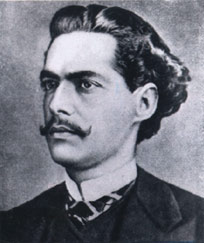This article needs additional citations for verification .(February 2024) |


Condorism (in Portuguese : Condorismo or Condoreirismo) was a Brazilian literary movement that lasted from the mid-1860s until the early 1880s. It is a subdivision of Brazilian Romanticism, being thus called "the third phase of Brazilian Romanticism", preceded by the Indianism and the Ultra-Romanticism. Condorism was created by the poet Tobias Barreto, who was one of its most significant figures alongside Castro Alves and Pedro Luís Pereira de Sousa.
Contents
The name "Condorism" comes from the condor, a bird of solitary and high flight, said to be capable of seeing things from a great distance. [1] Condorist poets believed they had this same ability, and should use it to educate people in the ways of justice and freedom.
Sometimes (albeit very rarely) Condorism is also called Hugoanism (in Portuguese : Hugoanismo), after Victor Hugo, who served as the major Condorist influence.